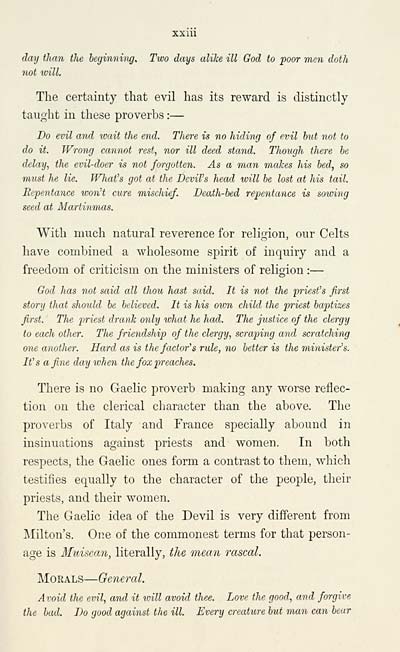Download files
Complete book:
Individual page:
Thumbnail gallery: Grid view | List view

day than the beginning. Two days alike ill God to poor men doth
not will.
The certainty that evil has its reward is distinctly
taught in these proverbs : —
Do evil and wait the end. There is no hiding of evil hut not to
do it. Wrong cannot rest, nor ill deed stand. Tlwugh there he
delay, the evil-doer is not forgotten. As a man makes his bed, so
must he lie. WTiat's got at the Devil's head will be lost at his tail.
Repentance wonH cure mischief. Death-bed repentance is sowing
seed at Martinmas.
With nnich natural reverence for religion, our Celts
have combined a wholesome spirit of inquiry and a
freedom of criticism on the ministers of religion : —
God has not said all thou hast said. It is not the priesfs first
story that should be believed. It is his own child the priest baptizes
first. The j^riest drank only what he had. The justice of the clergy
to each other. The friendship of the clergy, scraping and scratching
one another. Hard as is the factor'' s rule, no better is the minister's.
IVs a fine day when the fox preaches.
There is no Gaelic proverb making any worse reflec-
tion on the clerical character than the above. The
proverbs of Italy and France specially abound in
insinuations against priests and women. In both
respects, the Gaelic ones form a contrast to them, which
testifies equally to the character of the people, their
priests, and their women.
The Gaelic idea of the Devil is very different from
Milton's. One of the commonest terms for that person-
age is Mitisccm, literally, the mean rascal.
Morals — General.
Avoid the evil, and it will avoid thee. Love the good, and forgive
the bad. Do good against the ill. Every creature but man can bear
not will.
The certainty that evil has its reward is distinctly
taught in these proverbs : —
Do evil and wait the end. There is no hiding of evil hut not to
do it. Wrong cannot rest, nor ill deed stand. Tlwugh there he
delay, the evil-doer is not forgotten. As a man makes his bed, so
must he lie. WTiat's got at the Devil's head will be lost at his tail.
Repentance wonH cure mischief. Death-bed repentance is sowing
seed at Martinmas.
With nnich natural reverence for religion, our Celts
have combined a wholesome spirit of inquiry and a
freedom of criticism on the ministers of religion : —
God has not said all thou hast said. It is not the priesfs first
story that should be believed. It is his own child the priest baptizes
first. The j^riest drank only what he had. The justice of the clergy
to each other. The friendship of the clergy, scraping and scratching
one another. Hard as is the factor'' s rule, no better is the minister's.
IVs a fine day when the fox preaches.
There is no Gaelic proverb making any worse reflec-
tion on the clerical character than the above. The
proverbs of Italy and France specially abound in
insinuations against priests and women. In both
respects, the Gaelic ones form a contrast to them, which
testifies equally to the character of the people, their
priests, and their women.
The Gaelic idea of the Devil is very different from
Milton's. One of the commonest terms for that person-
age is Mitisccm, literally, the mean rascal.
Morals — General.
Avoid the evil, and it will avoid thee. Love the good, and forgive
the bad. Do good against the ill. Every creature but man can bear
Set display mode to: Large image | Transcription
Images and transcriptions on this page, including medium image downloads, may be used under the Creative Commons Attribution 4.0 International Licence unless otherwise stated. ![]()
| Early Gaelic Book Collections > Blair Collection > Collection of Gaelic proverbs and familiar phrases > (27) |
|---|
| Permanent URL | https://digital.nls.uk/76277587 |
|---|
| Description | A selection of books from a collection of more than 500 titles, mostly on religious and literary topics. Also includes some material dealing with other Celtic languages and societies. Collection created towards the end of the 19th century by Lady Evelyn Stewart Murray. |
|---|
| Description | Selected items from five 'Special and Named Printed Collections'. Includes books in Gaelic and other Celtic languages, works about the Gaels, their languages, literature, culture and history. |
|---|

